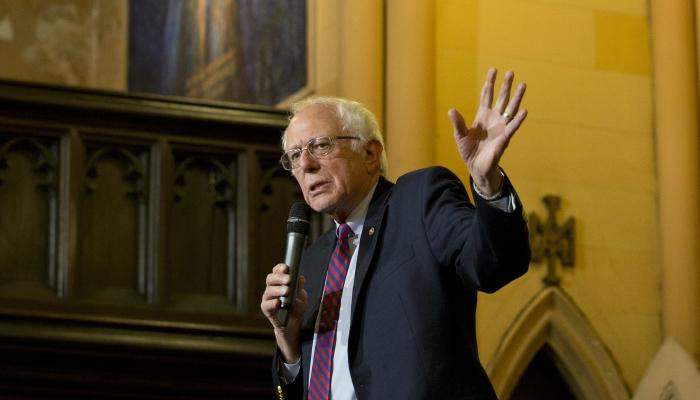 Sanders in Brooklyn. (AP Photo/Mary Altaffer)
Sanders in Brooklyn. (AP Photo/Mary Altaffer)By Azi Paybarah
At an appearance Saturday in Brooklyn, Senator Bernie Sanders said, “We owe a debt of gratitude to the Black Lives Matter movement.”
He said the movement “raised the consciousness” of the racial disparity within in the criminal justice system.
Sanders, who is looking for an upset victory against former secretary of state Hillary Clinton in New York’s April 19Democratic presidential primary, made the comments during a panel discussion about criminal justice matters in Downtown Brooklyn’s First Unitarian Congregational Society, a neo-gothic sanctuary that has been in use since 1844.
He recalled recently meeting with Black Lives Matter activists in Albany, and hearing from a mother there whose emotionally disturbed son was killed in a confrontation with police officers. He had a similar meeting in Vermont.
“A mother calls the police because her son is acting out. Guess what? Her son gets killed. A mother calls the police, and her own son gets killed,” he said. “It is not easy being a cop, but officers must be trained to use other mechanisms to control circumstances, other than lethal force.”
Police also needed to be held accountable when they break the law, he said, eliciting applause from the crowd of about 200 people.
“We’ve seen, too often, police officers break the law with impunity. That’s unacceptable,” he said.
He cited a report from Chicago Mayor Rahm Emanuel that Sanders said found “rampant racism” in the police department there.
Sanders said he highly doubted Chicago’s police force was the only one with that problem.
The event was part of Sanders’ attempt to chip away at Clinton’s formidable lead in New York, where African-Americans are among her strongest voting blocs.
Last week, both Sanders and Clinton spoke at the annual convention hosted by the Rev. Al Sharpton, who is among the best-known black public figures in the state and remained neutral in the contest. He was scheduled to moderate Saturday’s discussion but, bizarrely, backed out after the event was announced by the Sanders campaign.
Sharpton’s spokesperson later told reporters he had a scheduling conflict — his four-day convention had concluding activities today.
As he has done at nearly event public appearance, Sanders used the occasion to repackage his his stump speech about the need to shrink income inequality, get money out of politics and reinvest in education and housing and youth employment. He said those investments would prevent people from getting entangled in the criminal justice system in the first place.
Sanders grew up in an apartment in Flatbush and recalled hearing his parents fight about money. He said he mother dreamed of moving the family out of their apartment and into a “private home.”
“That was her dream,” he said. “She died at the age of 46 and she never achieved that dream.”
“To me, what I learned — when you talk about social justice — I don’t want to see lives destroyed or people suffer because they just don’t have the kind of money they need,” he said.
Youth unemployment among young high school graduates who are white is 33 percent, he said. For Latinos, that figure is about 36 percent, and it is higher than 50 percent for African-Americans, he said. For dropouts, the unemployment rate is higher.
That economic hurdle, he said, needs to be addressed in order to address the problem of why a disproportion number of minorities wind up incarcerated or with criminal records.
Speaking of teenagers who can’t find jobs, he said, “What happens to your self esteem … where do you think your going to turn your attention?”
As he has done before, Sanders called for removing marijuana from the federal list of dangerous drugs, and said private companies should not run prisons or detention facilities.
Sanders struck a more pragmatic tone when discussing gun control — an issue on which he has been criticized by the Clinton campaign.
“This country is very much divided on this issue,” he said.
And “rather than arguing year after year,” Sanders said, he wanted to find a “compromise,” on the issue.
That included expanding instant background checks to bar criminals and people with documented psychiatric problems from buying guns. He called the gun show loophole — which allows purchasers to evade background checks from purported “private sellers” at the show — “crazy.”
Sanders said “I think i can put together that consensus” between gun control advocates and gun owners.
Also on the panel were Linda Sarsour, co-founder of the Muslim Democratic Club of New York, and social justice activist, originally from Brooklyn, and Cornel West, a Princeton University professor and activist.
Councilman Jumaane Williams of Brooklyn, who chairs the Council’s Task Force on Gun Violence, was in the audience.
The most controversial element of Sanders criminal justice background — his vote for the the “Violent Crime Control and Law Enforcement Act of 1994” — was not addressed at the event.
Both Sanders and Clinton have come under criticism for that vote, which activists said led to the mass incarceration of people of color. Clinton, then the first lady, advocated for the bill and her husband, former president Bill Clinton, signed it into to law.
Sanders, who was a congressman at the time, voted for it.
The former president defended parts of the bill when heckled by protesters in Philadelphia recently, but later said he regretted the exchange.
Hillary Clinton said during last week’s debate in Brooklyn, “I’m sorry for the consequences that were unintended and that have had a very unfortunate impact on people’s lives.”
The Sanders campaign earlier noted the senator expressed reservations about the bill.
He said at the time, “We already imprison more people per capita than any other country, and all of the executions in the world will not make that situation right. We can either educate or electrocute.”














